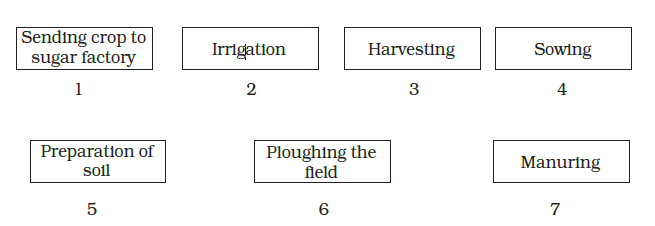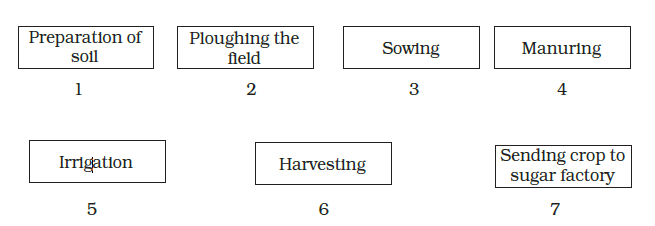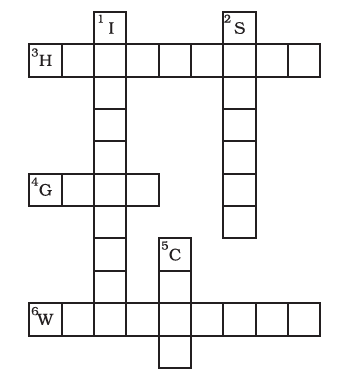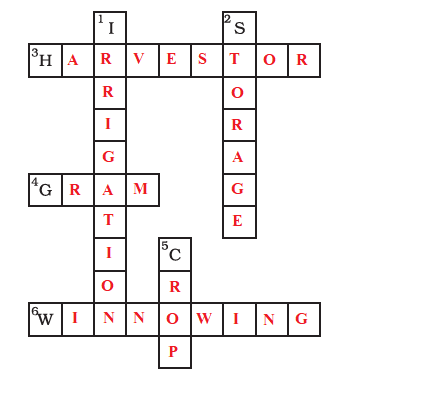NCERT Solutions Class 8 Science
The NCERT Solutions in English Language for Class 8 Science Chapter – 1 (Crop Production and Management) has been provided here to help the students in solving the questions from this exercise.
Chapter – 1 (Crop Production and Management)
1. Select the correct word from the following list and fill in the blanks.
| float, water, crop, nutrients, preparation |
(a) The same kind of plants grown and cultivated on a large scale at a place is called _____________.
(b) The first step before growing crops is _____________ of the soil.
(c) Damaged seeds would _____________ on top of water.
(d) For growing a crop, sufficient sunlight and _____________ and _____________ from the soil are essential.
Answer –
(a) The same kind of plants grown and cultivated on a large scale at a place is called the crop.
(b) The first step before growing crops is the preparation of the soil.
(c) Damaged seeds would float on top of the water.
(d) For growing a crop, sufficient sunlight and water and nutrients from the soil are essential.
2. Match items in column A with those in column B.
| A | B |
| (i) Kharif crops | (a) Food for cattle |
| (ii) Rabi crops | (b) Urea and superphosphate |
| (iii) Chemical fertilisers | (c) Animal excreta, cow dung urine and plant wastes |
| (iv) Organic manure | (d) Wheat, gram, pea |
| (e) Paddy and maize |
Answer –
| A | B |
| (i) Kharif crops | (e) Paddy and maize |
| (ii) Rabi crops | (d) Wheat, gram, pea |
| (iii) Chemical fertilisers | (b) Urea and superphosphate |
| (iv) Organic manure | (c) Animal excreta, cow dung urine and plant wastes |
3. Give two examples of each.
(a) Kharif crop
(b) Rabi crop
Answer –
Kharif crops – Paddy and maize
Rabi crops – Wheat and pea
4. Write a paragraph in your own words on each of the following.
(a) Preparation of soil
(b) Sowing
(c) Weeding
(d) Threshing
Answer –
(a) Preparation of soil – There are three major steps that are involved in the preparation of soil. These three steps are namely, ploughing, levelling as well as manuring. Ploughing aids in bringing the nutrients present in the deep soil arrive above the soil. Levelling is responsible for maintaining the uniform level of the soil. Manuring helps in yielding a better product to the farmers.
(b) Sowing – Sowing is known to be the process through which seeds get buried within the soil. The seeds germinate into the soil after the Sowing process has been completed. Further, the seeds develop into a whole plant.
(c) Weeding – The process of weeding means the act of eliminating wild plants from a place where they are not desired. Weeding helps in removing the unwanted plants.
(d) Threshing – Threshing is considered as a process in which the edible part of grain from the straw is loosened. Threshing is done after reaping as a process of grain preparation.
5. Explain how fertilisers are different from manure.
Answer –
| Fertilizers | Manure |
|---|---|
| Fertilizer is an inorganic salt. | Manure is a natural substance obtained by decomposition of cattle dung, human waste and plant residues. |
| Fertilizers are prepared in factories. | Manures can be prepared in fields. |
| Fertilizers are rich in plant nutrients such as nitrogen, phosphorus and potassium. | Manure is relatively less in plant nutrients. |
6. What is irrigation? Describe two methods of irrigation which conserve water.
Answer – The supply of water to crops at regular intervals is called irrigation. Methods of irrigation which conserve water are.
- Drip Irrigation: this irrigation system has an arrangement of pipes or tubes with very small holes in them to water plants drop by drop just at the base of the root. It is very efficient as water is not wasted at all.
- Sprinkler system: this irrigation has an arrangement of vertical pipes with rotating nozzles on the top. It is more useful in the uneven and sandy land where sufficient water is not available.
7. If wheat is sown in the Kharif season, what would happen? Discuss.
Answer – Wheat crop does not require much water to grow, so wheat would not grow in kharif season. The seeds would get destroyed in excess water due to rainy season.
8. Explain how soil gets affected by the continuous plantation of crops in a field.
Answer – If we sow continuously in a field then the lack of specific nutrients takes place in the soil. The field becomes unfertile. It does not give any time to soil to replenish the nutrients. Thus, the soil is unable to sustain any further healthy and good crop.
9. What are weeds? How can we control them?
Answer – Undesirable Plants which grow along with the main plants are called weeds. We control growth of weeds using process known as weeding. Weeding is done by –
- Using chemicals called weedicides, like 2, 4-D
- Removing Weeds by Hands
- Removing Weeds by Khurpi
10. Arrange the following boxes in proper order to make a flow chart of sugarcane crop production.

Answer –

11. Complete the following word puzzle with the help of the clues given below.
Down
1. Providing water to the crops.
2. Keeping crop grains for a long time under proper conditions.
5. Certain plants of the same kind are grown on a large scale.
Across
3. A machine used for cutting the matured crop.
4. A rabi crop, which is also one of the pulses.
6. A process of separating the grain from the chaff.

Answer –


Leave a Reply